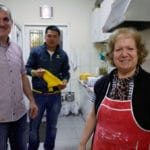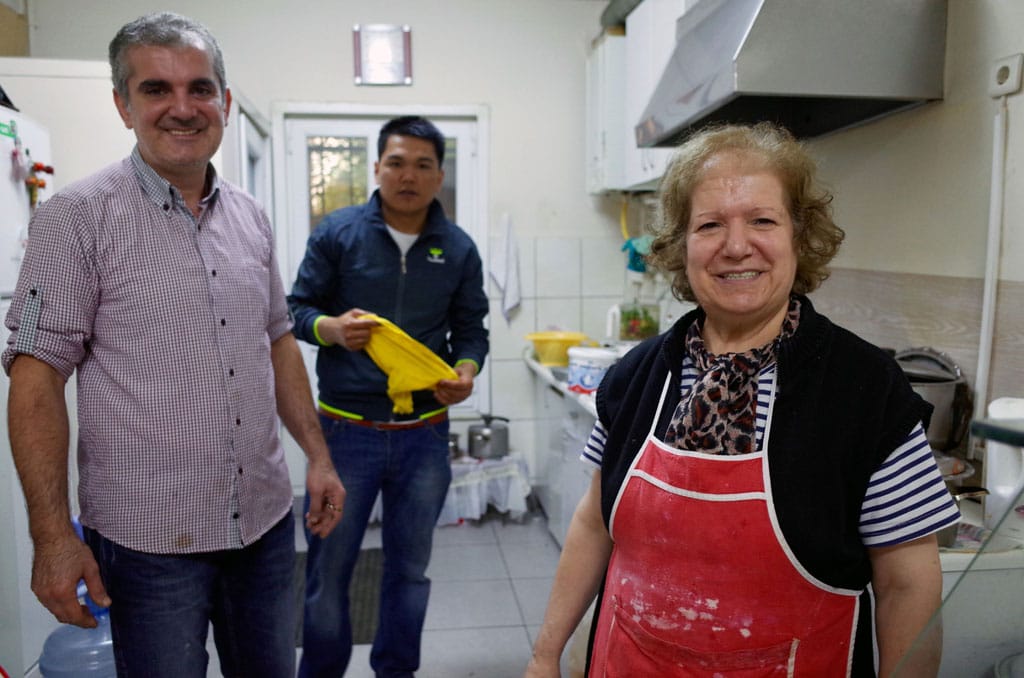In February, Nora Galleros and her partners at Kape’t Torta were concerned about crowds. Recently the bakery had added a line of pandesal, Filipino “salt bread” – actually, it’s sort of sweet – that often is bought in batches to share with family and friends. Expecting that their new ube cheese pandesal, colored by purple yam and filled with mild cheddar, would be a big seller, Nora and her partners insisted that customers place their orders before arrival. They didn’t want customers to have to line up outside the bakery, huddling together in the cold.
Poor weather is now a minor worry. The pandemic that swept into Queens exacted a terrible toll on many families – among them, the family of Nora’s partner Jeanette Uy, who in April lost her husband to Covid-19. The pain has been compounded by the mandated closure of houses of worship and other centers of community support, and by the shutdown of all but essential services.

Businesses that provide food did remain open, but under strict guidelines that only lately have begun to loosen. In New York City, as of late June, restaurants and the like can sell food and drink for delivery, for takeout, or – a recent change – for dining outside, provided that the venue has a suitable space to set up tables and chairs out front. Indoor dining might again be permitted as early as July, at much less than the usual legal occupancy. But in Queens, where real estate is often at a premium, many businesses don’t have enough room for customers to congregate.
It’s not simply a matter of the space itself. The Queens International Night Market, which sets up on a parking lot and a sprawling green behind the New York Hall of Science, postponed its mid-April opening and still remains dark. A gathering of more than 80 vendors and 10,000 customers is far too big to manage under the city’s current guidelines.
The Indonesian bazaar at St. James Episcopal Church – which attracts smaller but still substantial crowds to the church’s spacious parish house, with additional fair-weather seating on the lawn outside – hasn’t convened since early March. Fefe Anggono, the proprietor of Taste of Surabaya and the organizer of the bazaar, is grateful that everyone in her immediate circle is “happy and healthy,” but she misses the monthly get-together.
Instead, Fefe and some half-dozen other vendors prepare Indonesian food for delivery. “Basically every week they come to my house to drop [off] the food,” Fefe tells us; she consolidates customer orders and delivers them to the five boroughs, Long Island and New Jersey. With luck, she adds, by early September the bazaar might be able to hold its annual kaki lima, or street festival, provided that the city publishes guidelines on safely holding outdoor events.

Throughout Queens, many individual vendors have already returned to the streets. On a recent sunny day in Astoria, the Franky’s Souvlaki truck and the smaller cart of Elpida Vasiliadis, the Souvlaki Lady, fired up their grills on separate street corners. Business was brisk.
A slice of pizza can take to the street as easily as a stick of souvlaki, but at Rizzo’s, whole pies have been the mainstay throughout the pandemic. “Business is up,” said a counterman, thanks to “a lot of deliveries.” At Nonnas 1977, which specializes in square, sometimes elaborately dressed slices, the corporate catering business has dried up entirely, according to owner Leon Leandrou. And yet “business is crazy,” again thanks to deliveries, and to customers walking in for a mix-and-match box of six slices. Leon has resumed construction on a second Queens location, in Bayside.
By contrast, the pizza at Rosario’s – which is not a pizzeria but what New Yorkers think of as a deli-grocery – has always been a labor of love. A slice to go is still an option, but on a recent afternoon the line of customers seemed destined for the deli counter, which features imported specialties from both sides of the Adriatic.
It might be a “dream” to believe that business will be like before, says Point Brazil co-owner Elzi Botelho Ribeiro. At her self-service steam table, shrouded in plastic, disposable gloves as well as a mask are required; the display case of desserts, prepared by her sister, Erli, now offers a mere half-dozen temptations. On the other hand, Point Brazil has been preparing specialties such as acarajé “almost every week” rather than just on one Saturday per month; lately, says Elzi, “not everyone can come on the right day.” She hopes that business will pick up in the coming months as people return from sequester in Long Island, upstate New York, Connecticut and Brazil, too: “We have to have hope.”

Business is “OK” at Khao Kang, according to chef and owner Sopan “Tor” Kosalanan; his cafeteria-style Thai steam table is as fresh and well filled as ever. Alas, in the spirit of current NYC dining regulations, a notice implores customers, “Please do not stay here.” The rustic tables and chairs, which in warm weather look out through broad hinged windows to the quiet street beyond, remain empty.
Arada Moonroj, chef and a co-owner of the Northern Thai restaurant Lamoon, had relied chiefly on sit-down business before the pandemic. After a month-long closure, Lamoon reopened with a steam table – a “work in progress,” Arada says – that bars entrance to the small dining room. On request, Arada will still prepare “most of the regular menu,” but to secure the necessary ingredients, sometimes she has to “wait for one hour, two hours” in line at the market and to cope with fluctuating prices. Her imported supply of makhwaen, a relative of the Sichuan peppercorn, is running low; more common ingredients must serve many purposes. It’s possible that she might not be able to continue to focus so much on “the unique food from Northern Thailand.”
Alas, in the spirit of current NYC dining regulations, a notice implores customers, “Please do not stay here.”
“We had the virus a long time ago,” says Jimmy Lozano of Warique, but after two weeks in isolation, Jimmy and his Peruvian restaurant were back in operation. In lieu of dine-in business, Warique has won over “many more new customers” in the past few months from delivery. And, under New York’s relaxed guidelines for outdoor dining, Jimmy hopes to seat as many as a dozen people at tables on the sidewalk out front. But the temporary closure of his local fishmonger meant that for a week and a half, he had no corvina, so no ceviche. Jimmy couldn’t simply switch to a different fish – “my Peruvians would know.”
At Rudy’s Bakery and Café, “my whole team at work is doing fine,” says owner Antoinette “Toni” Binanti. “We’re very lucky.” Toni adds that “we have seen people come from all over” whose local bakery has closed. But “no more gatherings, no more parties” means fewer large sales. Rather than selling as many whole cakes as before, Toni and her pastry chef, Cristina Nastasi, have reconfigured the offerings to include miniature Danishes and tarts, gift bags of cookies and more cake by the slice (or slices). Tables on the sidewalk will be a next step, says Toni, who adds, “I don’t know how comfortable people will be sitting inside.”

At La Gran Via, Betsy Leites and her brother, Royd Leyva, have swapped locations: Betsy now manages the original small family bakery in Brooklyn, while Royd now works, often solo, at the larger bake shop in Queens. There, the emphasis is on individual portions of flan, tres leches and other sweets, as well as empanadas and sandwiches. Royd has moved his workspace to a window overlooking the sidewalk, in view of passersby. On those occasions when he does have a cake to personalize, Royd can provide a running commentary via a microphone and loudspeaker – and perhaps lure customers past the door and toward the display cases of desserts.
Back at Kape’t Torta, Nora and her team have expanded their baking hours, yet their fresh bread is often sold out at the end of the day. Some basics like yeast and flour have become more difficult to purchase in adequate quantities, while specialty ingredients imported from the Philippines, such as tablea, are particularly hard to source. But they continue to look to their friends in Philippines, and to the Filipino population in Queens, for what’s trending, says Nora. Soon, she hopes, a few customers will be permitted to sit at tables on the sidewalk; perhaps by autumn she’ll be able to invite them inside, for coffee and the latest pandesal.
 January 8, 2018 Going Deep
January 8, 2018 Going Deep
As the calendar year turns over, we’ve grown accustomed to the barrage of lists telling […] Posted in Elsewhere March 6, 2017 Ben-u Sen
March 6, 2017 Ben-u Sen
Istanbul's Kurtuluş neighborhood is home to a number of slow-burners, establishments […] Posted in Istanbul July 2, 2019 Khinkali Chronicles, Part III
July 2, 2019 Khinkali Chronicles, Part III
We bit into the khinkali, its handmade dough indelicate and sticky, as we like it. Steam […] Posted in Tbilisi
Published on June 30, 2020
Related stories
January 8, 2018
Elsewhere | By Culinary Backstreets
ElsewhereAs the calendar year turns over, we’ve grown accustomed to the barrage of lists telling us where to travel during the next 12 months. Oftentimes these places are a country or even a whole region – you could spend an entire year exploring just one of the locations listed and still barely make a dent.…
Interested in exploring this neighborhood? Join our Shop, Cook, Feast activity to go deep in Kurtulus.
March 6, 2017
IstanbulIstanbul's Kurtuluş neighborhood is home to a number of slow-burners, establishments that may be hidden in plain view due to their plainness but that end up becoming some of our favorites. Gimmicks don’t fly in down-to-earth Kurtuluş, where neighborly ties are strong and home-cooked meals are preferred. Tucked on a side street in the middle…
July 2, 2019
TbilisiWe bit into the khinkali, its handmade dough indelicate and sticky, as we like it. Steam poured out the newly made hole, and we blew lightly before slurping up the rich stock and gobbling the dumpling down, even the puckered knob. The ground pork and beef was packed with fresh cilantro, the juices absorbed into…




















































































